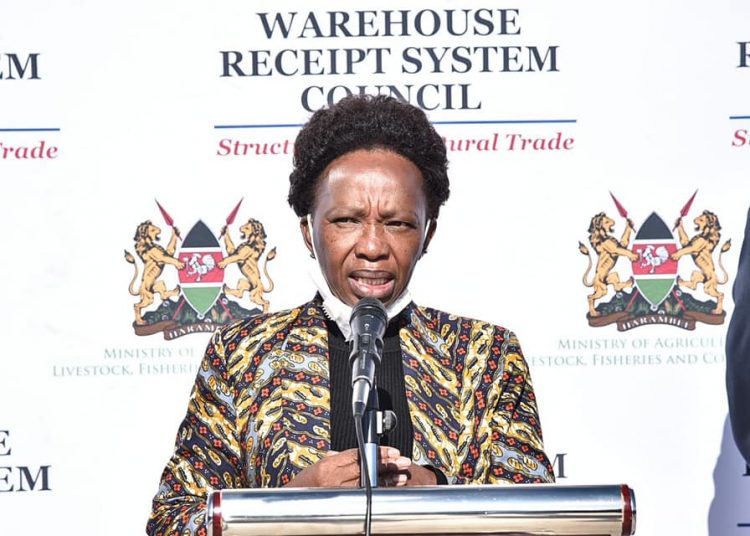Kenya is set to launch its warehousing receipt system at end of this month, Jane Ngige, the former illustrious leader of the Kenya Flower Council who now chairs the new government parastatal has confirmed.
The Warehouse Receipt System (WRS) Council aims to enable farmers to store their grains – maize, wheat and related – in certified warehouses to enable them to sell at an appropriate time when prices are favourable, giving them a better price discovery. Farmers can also use the receipt to apply for a loan from a partnering financial institution.
“The launch will be towards the end of February. It will be done in Nakuru County. The date is yet to be confirmed,” Jane Ngige said in an interview with the financialday.co.ke.
Ngige, who led Kenya Flower Council through the prosperous years when flower and vegetable exports became one of the top key foreign exchange earners for Kenya said one of the key challenges of roping in banks to be partners of the system has been overcome, with Equity Bank, Coop Bank, Absa and KCB Bank emerging as main prospective partners.
“We have a caucus of six banks. They have been part of the conversation. As to whether they will participate, that is their business decision to make,” said Ngige.
The Warehouse Receipt System is expected to trigger investments in warehousing infrastructure in the counties, with the council expected to work closely with the County Ministries of Agriculture to undertake public participation among the farmers.
County governments will also take up the role of licensing of those warehousing facilities as per the legal requirements of the Warehouse Receipt System Council, which was formed under an Act (law) known as Warehouse Receipt System Act, 2019.
Front line beneficiaries are expected to be maize farmers in the Rift Valley region, followed by those in Central Kenya with rice, green grams in the greater Eastern Kenya among others that will follow. Coffee and tea farmers are not expected to benefit immediately because of the uncertainty around the reforms being implemented by the national government within the two sectors.
The National Cereals and Produce Board (NCPB), which controls the biggest warehousing infrastructure in various counties will be the anchor storage partner under the Warehousing Receipt System, charging as Ksh3 for a 90 kilogramme of maize per month as a storage fee, said Ngige.
“The NCPB has already managed to sign storage agreements with ten counties in the Central Kenya and Rift Valley regions,” said Ngige.
According to the Warehouse Receipt System Act, 2019, warehouse operator shall apply to the
respective county executive committee member for a licence to operate within the Warehouse Receipt System. The warehouse receipt may be in hard or electronic form and is a document of title to goods.
The Council has been on a familiarization mission in various counties ahead of the launch later this month.
In Nyeri, the County Minister for Agriculture James Wachihi said the county is ready to implement the system. “The farmer is the focal point and stands to benefit,” he said.
The WRS is open to interested farmers, aggregators, cooperative societies, traders, public and private warehouse operators, financial institutions, input suppliers, insurance companies, processors, marketers and consumers, Ngige said.
The governor representative and County Secretary Ben Gichichio also affirmed the county’s willingness.“The county government has embraced the project and we are going to do a lot of sensitization to the farmers so they can grasp and run away with this program,” he said.



![[Photo/Unsplash]](https://financialday.co.ke/wp-content/uploads/2023/11/NFT-360x180.jpg)


